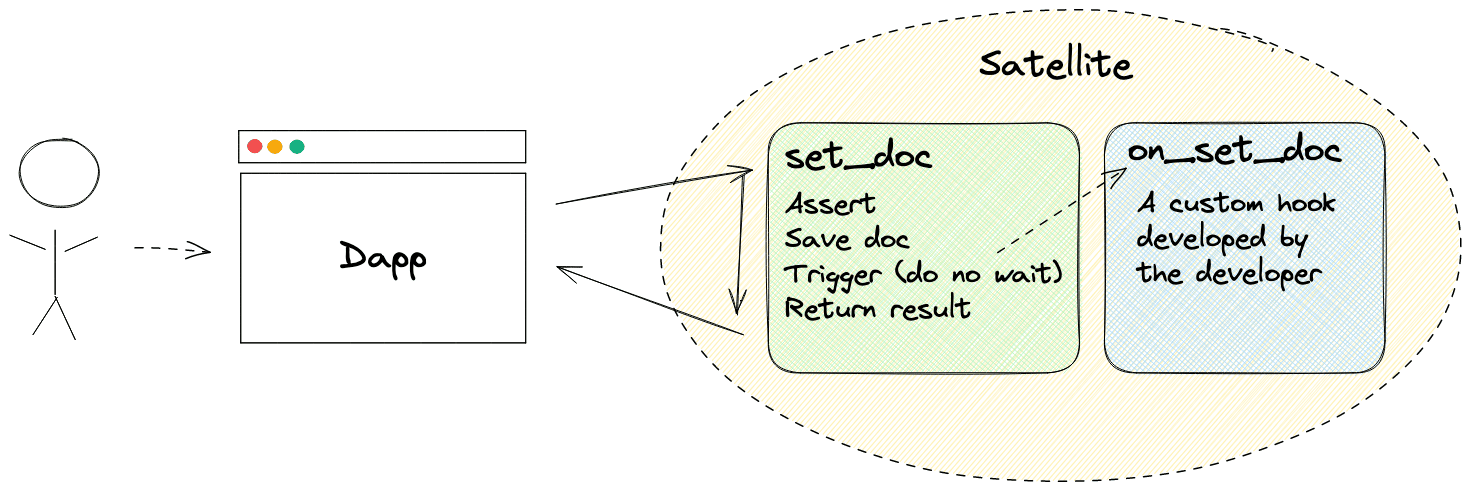Functions
Functions are a set of features enabling developers to extend the native capabilities of Satellites using Rust or TypeScript. They let you define serverless behaviors directly within your containerized environment.
Triggered by events like document and asset operations, they allow you to automatically run backend code or assertions. These functions are shipped with your container and don’t require you to manage or scale your own servers.
How does it work?
Functions are defined using hooks that automatically respond to document and asset events such as create, update, or delete. This allows you to embed dynamic behavior directly into your container.
A naive schema representation of a hook that is triggered when a document is set:

Asynchronous Hook Spawning
When a Function is triggered, it spawns hooks asynchronously, operating independently of the caller's action. This means that the execution of the hooks is initiated without waiting for a synchronous response, ensuring that the flow of update calls to the Satellite remains unhindered. Consequently, callers may receive feedback on their actions before the corresponding hooks have commenced their execution.
Error-Resilient Execution
Hooks are initiated only when there are no errors in the preceding operations. This ensures a robust and dependable execution flow, promoting reliability and consistency in the functioning of Functions.
Optional
Custom hooks are not active by default. You need to opt in to enable event-driven execution of your own logic.
Available Hooks
| Hook | Provider | Description |
|---|---|---|
on_set_doc | Datastore | Triggered when a document is created or updated. |
on_set_many_docs | Datastore | Activated for operations involving multiple documents. |
on_delete_doc | Datastore | Invoked when a document is deleted. |
on_delete_many_docs | Datastore | Used when multiple documents are deleted. |
on_delete_filtered_docs | Datastore | Invoked when documents are deleted according filters. |
on_upload_asset | Storage | Triggered during asset upload. |
on_delete_asset | Storage | Activated when an asset is deleted. |
on_delete_many_assets | Storage | Used for deleting multiple assets. |
on_delete_filtered_assets | Storage | Invoked when assets are deleted based on filters. |
on_init | Satellite | Called during the initialization of the Satellite. |
on_post_upgrade | Satellite | Invoked after the Satellite has been upgraded to a new version. |
Assertions
In addition to hooks, developers have the option to expand the native rule set of their Satellites by creating custom assertions. These assertions can be implemented similarly to hooks, with the key difference being that they are synchronous and must return a result indicating the outcome of the assertion.
| Assertion | Provider | Description |
|---|---|---|
assert_set_doc | Datastore | Ensures a document can be created or updated. |
assert_delete_doc | Datastore | Verifies that a document can be deleted. |
assert_upload_asset | Storage | Confirms an asset upload can be committed. |
assert_delete_asset | Storage | Checks that an asset can be deleted. |
Rust vs. TypeScript
You can write serverless functions in either Rust or TypeScript, depending on your needs and project goals.
Rust will always be more performant than TypeScript because TypeScript code is evaluated by the Rust runtime under the hood. This means that, no matter how optimized, functions written in Rust will consume fewer cycles and execute faster. That said, not every project needs maximum performance from day one. For smaller apps, rapid prototypes, or internal tools, TypeScript can be a perfect fit.
The Rust ecosystem is also more mature, having been supported on the Internet Computer from the beginning. It benefits from better compatibility with libraries that support wasm32-unknown-unknown.
TypeScript support was introduced on Juno in April 2025. While developer-friendly, it currently lacks Node.js polyfills, which means many npm libraries may not work out of the box. That said, we’re actively improving this — and if there's a specific package or feature you'd like to use, reach out. We're happy to explore adding support.
It is worth to note that in both environments, there is no standard library or file system access. Functions like reading from or writing to disk aren’t available. Instead, e.g. Juno provides purpose-built features such as Storage.
Despite their differences, Rust and TypeScript serverless functions are designed with interoperability in mind. The API surface and structure are intentionally aligned, so migrating from TypeScript to Rust later should feel intuitive and straightforward.
Summary
| Feature / Consideration | Rust | TypeScript |
|---|---|---|
| Performance | ✅ Highest, runs natively in WASM | ⚠️ Interpreted by Rust, slower |
| Library Support | ✅ Many crates | ⚠️ Limited (only few Node.js polyfills currently supported) |
| Ease of Use | ✅ Developer-friendly (with or without AI) | ✅ Developer-friendly (with or without AI) |
| Migration Path | — | ✅ Can migrate to Rust easily |
| Recommended For | Production apps, performance-critical code | Prototypes, smaller tools, quick dev cycles |